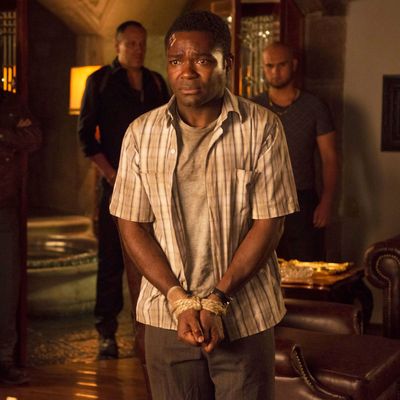
When people bemoan the fact that nobody makes movies “for grown-ups” anymore, they’re usually not thinking about movies like Gringo. R-rated, movie-star movies with a more nuanced treatment of adult relationships than the latest Mission: Impossible that also get the full backing of a major studio are rare specimens these days. But as much as we’re missing the Fargos of the world, we’re also missing the Out of Sights. Gringo, the feature directorial debut of veteran stuntman Nash Edgerton, aspires to the existential tangle of the former and the pulp of the latter, and while it doesn’t exactly reach either film’s heights, it’s still an engaging ride through all its needlessly but enjoyably convoluted twists and turns.
The script, by Anthony Tambakis and Michael Stone, follows hapless do-gooder immigrant Harold Soyinka (David Oyelowo), who is in middle management at the confidently misspelled Promethius Pharmaceuticals. Harold gets word of a merger that might put his career in jeopardy, right as he’s scheduled to go on a trip to Mexico with his two callous and narcissistic bosses (Joel Edgerton and Charlize Theron). On one terribly unfortunate night, he receives confirmation of his pending unemployment, and the news that his wife (Thandie Newton) has been having an affair. Personally and professionally humiliated and with nothing to lose, he goes rogue and stages his own hostage kidnapping in order to bilk his employers out of $5 million. As you might guess, nothing goes as planned.
Nash Edgerton, for those who haven’t looked up his photo on IMDb and confirmed as much, is the brother of Joel, whose Richard Rusk is the amoral centerpiece on a table full of all manner of cowardice and greed. I wonder if Joel would have gotten the chance to play so unrepentantly nasty a part as he does here without Nash’s support; at any rate, it’s a welcome change of pace after a long run of beleaguered nice-guy casting. But even more of a revelation is Oyelowo as a very different kind of beleaguered nice guy — Harold Soyinka is good but emphatically not boring or saintly, and his scenes where he’s faking his kidnapping are the funniest in the entire film. (Give David Oyelowo more comic roles!) There’s also nothing accidental about his Nigerian heritage; it’s all baked into the movie’s themes in a surprisingly smart way.
Theron, on the other hand, is doing something a little more in line with what we’ve seen from her before — Elaine is basically her character from Young Adult reimagined as a high-powered ladyboss. There are moments of brilliant derangement — upon discovering that the man she’s having an affair with has himself been having an affair, she sits stewing in her car outside his building, muttering that she’s “Daddy’s blue-ribbon girl,” a scene as ridiculous as it is terrifying. Elaine — I think, rightfully, given her character’s actions and profession — steps into the realm of straight-up unlikability about halfway through the film; there’s not much coming back after her grotesque, drunken impersonation of a deaf person. But strangely, the script thinks we might still be rooting for her — because she’s not as bad as Richard? Because she’s a woman? — and hers is the most tone-deaf resolution of the film.
The film is also weighed down a bit by a subplot involving Amanda Seyfried and an unbeknownst-to-her drug-running boyfriend (played by the very good and continuously underused Harry Treadaway), whose paths inevitably collide with Harold’s. Seyfried’s Sunny represents a kind of reassurance of the goodness of humanity incarnate for Harold, but she doesn’t really have much to do herself; she basically gets taken on a confusing vacation, then goes back home. Sharlto Copley also shows up as Richard’s ex-mercenary brother (there are a lot of people in this movie) and it’s one of his better performances in recent years, but gets pretty easily lost in a movie full of big performances and set pieces.
But both Seyfried and Copley’s characters, in addition to being cogs in Gringo’s enjoyably impossible-to-follow plot, also serve as bounce boards to further shade in Harold, and by the end, Oyelowo has earned the otherwise-hacky spiking of the lens in the final shot. Gringo is a slightly above-average crime farce with a way above-average protagonist — both in terms of writing and performance, and especially given the genre. It’s a surprising high point in Oyelowo’s already distinguished career, and a not-at-all shabby directorial debut for Edgerton.




